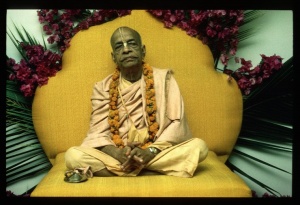SB 10.57.31: Difference between revisions
No edit summary |
(Vanibot #0054 edit - transform synonyms into clickable links, which search similar occurrences) |
||
| Line 23: | Line 23: | ||
<div class="synonyms"> | <div class="synonyms"> | ||
''iti'' | ''[//vanipedia.org/wiki/Special:VaniSearch?s=iti&tab=syno_o&ds=1 iti]'' — thus; ''[//vanipedia.org/wiki/Special:VaniSearch?s=aṅga&tab=syno_o&ds=1 aṅga]'' — my dear (King Parīkṣit); ''[//vanipedia.org/wiki/Special:VaniSearch?s=upadiśanti&tab=syno_o&ds=1 upadiśanti]'' — were proposing; ''[//vanipedia.org/wiki/Special:VaniSearch?s=eke&tab=syno_o&ds=1 eke]'' — some; ''[//vanipedia.org/wiki/Special:VaniSearch?s=vismṛtya&tab=syno_o&ds=1 vismṛtya]'' — forgetting; ''[//vanipedia.org/wiki/Special:VaniSearch?s=prāk&tab=syno_o&ds=1 prāk]'' — previously; ''[//vanipedia.org/wiki/Special:VaniSearch?s=udāhṛtam&tab=syno_o&ds=1 udāhṛtam]'' — what had been described; ''[//vanipedia.org/wiki/Special:VaniSearch?s=muni&tab=syno_o&ds=1 muni]'' — of sages; ''[//vanipedia.org/wiki/Special:VaniSearch?s=vāsa&tab=syno_o&ds=1 vāsa]'' — the residence; ''[//vanipedia.org/wiki/Special:VaniSearch?s=nivāse&tab=syno_o&ds=1 nivāse]'' — when He is residing; ''[//vanipedia.org/wiki/Special:VaniSearch?s=kim&tab=syno_o&ds=1 kim]'' — how; ''[//vanipedia.org/wiki/Special:VaniSearch?s=ghaṭeta&tab=syno_o&ds=1 ghaṭeta]'' — can arise; ''[//vanipedia.org/wiki/Special:VaniSearch?s=ariṣṭa&tab=syno_o&ds=1 ariṣṭa]'' — of calamities; ''[//vanipedia.org/wiki/Special:VaniSearch?s=darśanam&tab=syno_o&ds=1 darśanam]'' — the appearance. | ||
</div> | </div> | ||
Latest revision as of 19:30, 17 February 2024

A.C. Bhaktivedanta Swami Prabhupada
Please note: The synonyms, translation and purport of this verse were composed by disciples of Śrīla Prabhupāda
TEXT 31
- ity aṅgopadiśanty eke
- vismṛtya prāg udāhṛtam
- muni-vāsa-nivāse kiṁ
- ghaṭetāriṣṭa-darśanam
SYNONYMS
iti — thus; aṅga — my dear (King Parīkṣit); upadiśanti — were proposing; eke — some; vismṛtya — forgetting; prāk — previously; udāhṛtam — what had been described; muni — of sages; vāsa — the residence; nivāse — when He is residing; kim — how; ghaṭeta — can arise; ariṣṭa — of calamities; darśanam — the appearance.
Translation and purport composed by disciples of Śrīla Prabhupāda
TRANSLATION
Some men proposed [that the troubles were due to Akrūra's absence], but they had forgotten the glories of the Supreme Lord, which they themselves had so often described. Indeed, how can calamities occur in a place where the Personality of Godhead, the residence of all the sages, resides?
PURPORT
Śrīla Viśvanātha Cakravartī provides the following insight on this verse: In Benares Akrūra became famous for performing sacrifices on golden altars and for his abundant charity to the brāhmaṇas. When the citizens of Dvārakā heard about this, some of them gossiped that Kṛṣṇa, considering Akrūra a rival, had sent him into exile. To dispel this new and incredible stain on His reputation, Lord Kṛṣṇa created various calamities in Dvārakā, thus inducing the citizens to call for Akrūra's return, which the Lord then ordered.